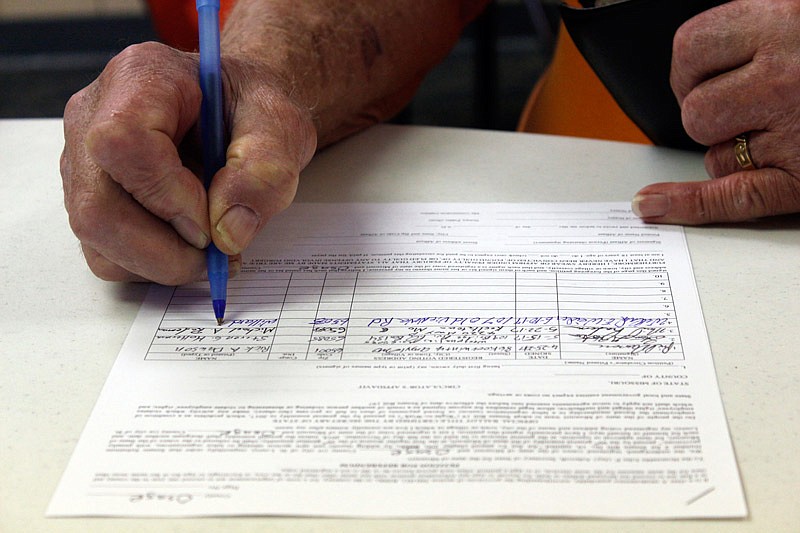Jamie McKinney built her life through Sheet Metal Workers Local 36 in Fulton.
Now a second-year apprentice, the union gives her an education, insurance and, she hopes, a pension one day. After two years of hard work, she feels much better than when she did as young factory worker at ABB's Jefferson City factory.
"I don't have to worry as much about money," she said.
McKinney and other union members are concerned Missouri's new right-to-work law will weaken unions and lower wages when it takes effect Aug. 28. Business groups based in Jefferson City, though, think the new law will grow Missouri's economy.
As a student at Jefferson City High School, McKinney took a welding class. That sparked her interest to try manufacturing. She worked briefly at ABB but quickly realized the job didn't pay her bills. So, while still fresh out of high school, McKinney, now 20, joined Sheet Metal Workers Local 36 and started a five-year apprenticeship.
The union helped her find a job at Hulett Heating and Air Conditioning in Columbia. Every four to five months, she goes through a series of educational classes while working. During her first year, she learned how to read blueprints and went through Occupational Safety and Health Administration training.
This year, she's learning welding skills. Next year, she'll learn about architecture, and in her fourth and fifth years, she'll learn skills she needs as a foreman. Her $100- to $200-per-month union dues, which she said represent a small fraction of her income, pay for the classes, add to a 401(k) and pay into a pension fund for union members. McKinney's dues also cover her health insurance, which she receives through the union instead of her employer.
Without the union, McKinney admits, she'd feel lost. With the new law set to take effect, she fears things may go back to the way they were before she joined the union.
"This is going to hit us hard," McKinney said. "I just don't know what I'll do."
Gov. Eric Greitens signed Missouri's right-to-work law in February, making Missouri the 28th right-to-work state. The law allows unions to continue representing workers but provides employees with the ability to opt-out of paying union dues. Before the bill's signing, state law required employees to pay union dues, where unions exist, to unions that represent employees in their field. Federal law requires unions to represent all employees, including during costly court cases with employers, whether they pay union dues or not.
Senate Bill 19 blew through the House and Senate, whose Republican supermajorities quickly passed the legislation. Greitens signed the bill less than a month after his inauguration at an abandoned warehouse in Springfield, saying the bill protected employees.
"It simply says that every worker should have the choice about whether or not they want to join a union," Greitens said at the signing ceremony, the Springfield News-Leader reported. "They should have the choice. And if they choose not to join, they can't be forced out of their job."
In May, construction union leaders fended off legislation that would have repealed Missouri's prevailing wage law, which sets minimum wages for workers on state and local construction projects. The House passed that bill, but it died after the Senate failed to pass it before the legislative session ended May 12.
Greg Schrock, a local electrician and president of the International Brotherhood of Electrical Workers 257 in Jefferson City, said at the time he saw efforts to repeal prevailing wage and enact right to work as tactics by Republican leaders to weaken unions. He maintains that stance.
Schrock, like McKinney, hasn't heard of any colleagues who plan to leave his union. He thinks there will be few immediate effects. Still, Schrock thinks unions will be weakened over time.
"Right off the bat, we're not all going to lose our jobs and have to find other employment," Schrock said. "I've never heard any of my members say they would (leave), but statistics show there will be a few. I don't know if it's going to be enough to hurt us."
Also like McKinney, Schrock built his life around a union. He phoned a News Tribune reporter on a Saturday while drinking a beer next to his pool over the Independence Day weekend. After working 36 years as an electrician, he's not considering leaving IBEW 257. He said he could easily make a decent wage for a non-union employer, but unions have given him too much over the past three decades.
"I will never be non-union," Schrock said.
McKinney also said she'll stick with Local 36.
"I'm going to do whatever I can to stick with my union," McKinney said. "It's a brotherhood and a sisterhood sticking together."
Statewide and nationwide, business leaders are split on the effect right to work will have. Data from various sources often show conflicting reports, depending on the viewpoint of the author.
The Missouri Chamber of Commerce and Industry points to U.S. Bureau of Economic Analysis data showing states with right-to-work laws saw an 8.6 percent growth in jobs between 2005-15.
The state Chamber of Commerce's President Dan Mehan said his members thought it was about time Missouri joined other right-to-work states.
"There's a huge uptick in the number of inquiries coming into the state of Missouri all around the state (that) just weren't happening before," Mehan said. "Missouri was not on the list, but now we are."
Mehan, like Greitens and other right-to-work proponents, also thinks right to work will create jobs. He also thinks it will help increase Missouri's Gross Domestic Product output, which he noted lags far behind many other states.
"It's all about driving opportunities," he said. "The states that are right-to-work get more shots at it than the states that aren't."
The Missouri Chamber of Commerce works to provide opportunities for employees by making the state attractive to businesses already here and businesses looking to relocate here. Mehan acknowledged there's a large skills gap in many industries between open jobs and employees willing to fill them. Unions aren't the only entities that can educate workers, he said.
"Look at community colleges," Mehan said. "If (unions) are doing a good job performing that function, then they'll earn the support of the people they help. It's got nothing to do with right to work."
The chamber also points to BEA data that show wages increased by 11.9 percent in right-to-work states between 2005-15. Wages in non-right-to-work states grew by 7.7 percent during that time frame, according to the BEA.
A 2015 study by the liberal Economic Policy Institute, though, says wages are generally 3.1 percent lower in right-to-work states. The study found wages tend to be 15.8 percent higher, or $23.93 per hour, in non-right-to-work states than in right-to-work states, where wages averaged $20.66 per hour. This translates to a difference of about $1,500 per year.
"No matter how you slice the data, wages in right-to-work states are lower, on average, than wages in non-right-to-work states," according to the EPI study.
Meanwhile, a 2015 study prepared by Ohio University economics professor Richard Vedder for the conservative Wisconsin Research Policy Institute said right-to-work laws added six percentage points to the growth of states from 1983-2013. This study also found states that experience a small drop in union participation - up to about a 3 percent drop - still experience strong economic growth after right-to-work laws take effect.
"When right-to-work laws combined with other factors such as low taxes cause an economy to grow, union density eventually can grow as well," Vedder's study noted.
In 2016, unions represented just 262,000 of the 2.7 million employed Missourians, according to the U.S. Bureau of Labor Statistics. While unions represented 9.7 percent of Missourians in 2016, that's up from 8.4 percent in 2014. Between 2014-16, Missouri unions added about 48,000 members as the state added about 1.5 million jobs. Union participation in Missouri peaked in 1989, when 15.5 percent of the workforce had union memberships.
Mike Louis, president of the Jefferson City-based chapter of the Missouri AFL-CIO union, leads a campaign seeking to force a referendum on Missouri's right-to-work law onto the November 2018 ballot. He said right to work affects all Missourians.
"In right-to-work states, wages go down for everybody," Louis said.
Schrock said non-union construction companies in Missouri base their pay just under wages local unions set.
"Whether they like it or not, the unions set the scale for everybody in the state," Schrock said. "If the union scale goes down, their (pay) does, too."
Mehan, like Greitens, thinks right to work will simply let Missourians choose whether they want to be in unions - and that, in the end, that could strengthen unions.
"If people think you're doing a good job, they will join your union," Mehan said. "If they don't, they won't. Why can't they leave it up to the individual?"
Read the full July 24, 2017, edition of #jcmo Inside Business:



